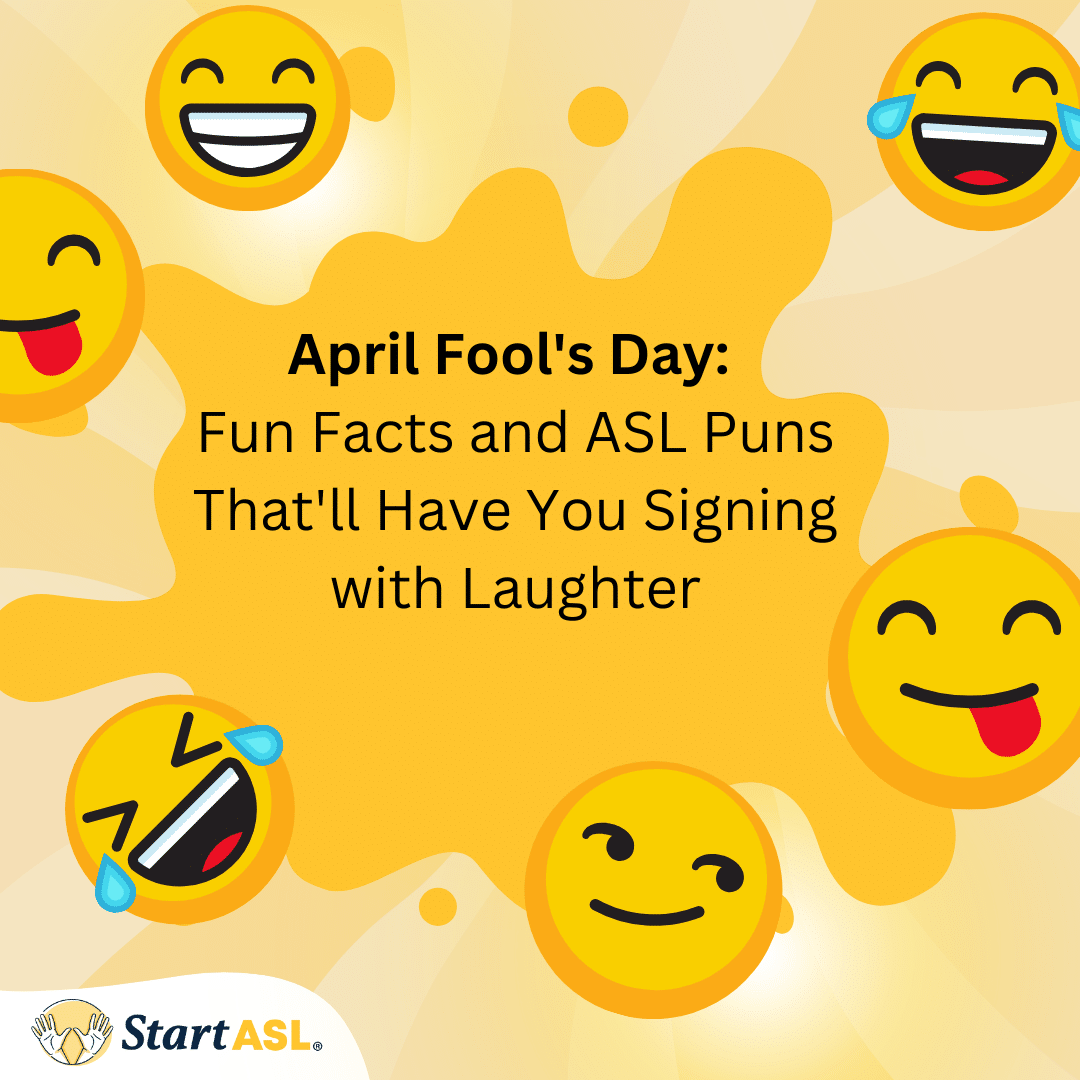
Dummy Hoy (William Hoy) – The First Deaf Major League Baseball Player
- by Michelle Jay
- 11 Comments
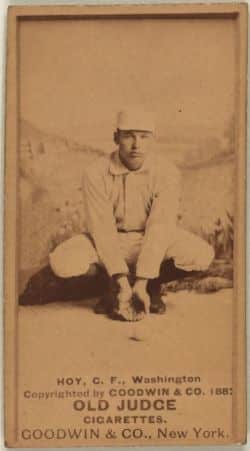
Dummy Hoy made history as the first deaf major league baseball player. He’s also not famous just because he was deaf; he was also a remarkably talented and skilled baseball player.
Dummy was anything but dumb. Baseball is known as America’s sport, and Hoy had a lot to do with what happens in baseball today. He deserves to be in the National Baseball Hall of Fame.
Dummy Hoy’s real name is William Ellsworth Hoy but he was also known as Dummy, Billy Hoy, and Bill Hoy. Back then, the word “dumb” was used to describe someone who could not speak. Hoy actually referred to himself as “Dummy” instead of William and often corrected people. That is how he got that nickname.
Hoy was born in Houckstown, Ohio, on May 23, 1862. Due to an illness in his childhood, he lost his hearing. However, he wasn’t going to let this loss keep from achieving his dream.
He graduated from the Ohio School for the Deaf and started his professional career in 1886 in Oshkosh, Wisconsin. Hoy went on to play for five different major league teams as an outfielder for fifteen years.
During that time, he racked up some amazing statistics. He was a rookie in the majors, but led the National League in stolen bases.
Playing for the Chicago White Sox, Hoy hit a grand-slam home run in 1901. This was the first ever grand-slam in the American League.
Dummy has also been widely credited with creating the hand signals that are still used in baseball today. When he started his baseball career, the Umpire shouted all the calls. When Hoy was up to bat, he asked his third-base coach to raise his right arm to indicate a strike and his left arm to indicate a ball, as the story goes.
Soon, the coach was also signaling the opposing team’s balls and strikes to Dummy when he played outfield. Gradually, hand signals became common use in baseball among the players, managers, and umpires.
He even inspired a sort of sign language in the crowds. With Dummy being such a loved player as an amazing outfielder, a consistently great hitter, and exciting base-stealer, the crowds would jump up and wildly wave their arms to cheer for him when he made a great play.
Dummy Hoy finished his career in Los Angeles playing for the Pacific Coast winter league, after playing 1,792 games (a record!) in the major leagues. He finished with stats of:
- 2,000 hits
- 1,400 runs
- 594 stolen bases
- .287 batting average
- .386 on-base percentage
Hoy’s very last play secured the 1903 pennant for his team.
In 1951, Dummy Hoy was the first player to be entered in the American Athletic Association for the Deaf’s Hall of Fame.
To this day, people are fighting to get him inducted into the National Baseball Hall of Fame.
Hoy died in 1961 at the age of 99.
It truly is amazing to see a deaf person bring so much history into baseball. And most people don’t even know about it!
William “Dummy” Hoy Articles by Students
Who is your favorite person from deaf history?
William “Dummy” Hoy
by Christina Buccafurni | April 27, 2016
William “Dummy” Hoy (May 23, 1862 – December 15, 1961) is known for being the most accomplished deaf baseball player to play in Major League Baseball. He was born in Houckstown, Ohio and lost his hearing during childhood due to an illness. The word “dumb” meant someone who couldn’t speak (yet Hoy was known for a soft high pitched squeaky voice) “so he was nicknamed “Dummy”. This didn’t seem to bother Hoy, as when people would refer to him as William, he would correct them and ask them to call him “Dummy”. He played center field for several teams. He held records in his league during his career and is even credited for creating the hand signals for safe and outcalls that are still used today.
Hoy graduated from the Ohio School for the Deaf then went on to play for 5 different major league teams. Through his baseball career, he led the National League in stolen bases. While playing for the White Sox, he hit the very first grand slam home run in the American League. When Hoy was at bat, he asked the 3rd base coach to use his right hand to show if the ball pitched was a strike and his left to indicate a ball. The coach also did this for Hoy while he was in outfield and it just started to catch on. Hand signals are still used by umpires, coaches and players to this day. He even inspired the crowds to use certain hand signals when they cheered for him in particular, they would jump and wave their hands around to show him their excitement rather than screaming or cheering. Hoy’s very last play in baseball actually secured the pennant for the season.
I am a huge fan of baseball and found Hoy’s story both inspiring and amazing. I am embarrassed and saddened that I have never heard of William “Dummy” Hoy until I started to research “Famous Deaf people in History”- especially since he literally added history to the game. Had he never played, who knows how the umpires would show strikes and balls and how coaches would communicate plays with the players. Through all of his challenges, Hoy still broke records and made an impression on the deaf community and my favorite sport- baseball. He was the first member elected into the American Association of the Deaf Hall of Fame and there are still many people fighting to have him inducted into the Baseball Hall of Fame. I really hope he makes it here. I think his story is inspiring and just plain cool.
William “Dummy” Hoy
by Karrina (America) | November 1, 2013
I would have to say William “Dummy” Hoy is my favorite because he showed a lot of Deaf power. He became deaf at the age of 3 because of meningitis. He grew up and graduated from Ohio State School for the Deaf as valedictorian. He started baseball as just a fun thing to do on the weekends, but he soon earned a professional contract in 1886 with the Oshkosh, Wisconsin team.
He is now known for being the most accomplished deaf player in Major League history. You could not have watched him play baseball and think that he was handicapped for being deaf! It is also said that William created the hand signals that are used in baseball even to this day. He is one of the 29 Major League players to have been on 4 different teams. He must have been really good to have had that many teams he had played for!
William was a Major League Baseball player from 1888 to 1902. Hoy retired with a .287 batting average, 2044 hits, 1426 runs, 726 runs batted in, 248 doubles, 121 triples and 40 home runs. He had 487 stolen bases from 1888 through 1897, and 107 more after the statistic was redefined to its present meaning in 1898. His 1795 games in the outfield ranked second to Jimmy Ryan in major league history.
William “Dummy” Hoy was a true influence to not only deaf but also hearing people.
William “Dummy” Hoy
by Leah (London, ON, CA) | April 11, 2013
I was born hard of hearing and I have heard of a few famous deaf people on and off in my life such as Helen Keller, Beethoven, Alexander Graham Bell, Heather Whitestone, Sue Thomas, Deanne Bray, Marlee Matlin, etc. I admire everyone that I listed above especially Sue Thomas for landing an F.B.I. job because of her lipreading skills (maybe I should try to apply for the F.B.I. because I can lipread too), Heather Whitestone for winning the Miss America 1995 pageant (I loved how she gloried God through her dance) and Marlee Matlin, Sean Berdy, Katie Leclerc, & Ryan Lane for acting in the Switched at Birth show (my #1 favourite television show).
But to answer your question, I have decided to pick someone else that I have not heard of until yesterday when I read your Famous Deaf People page for the first time to be more fair because it isn’t fair that I choose someone that I have already heard of because I’m hearing-impaired and my interest in deaf culture growing up. Of all the people that I have not heard of, I have chosen William “Dummy” Hoy. Why? It brought back memories of my childhood. I played softball for two summers, or was it three? I can’t remember. Anyway, I remembered during the first summer when I played softball, when it’s my turn to go up to bat, I had to turn off my hearing aids because if I didn’t, it would whistle when I put the helmet on. Which is not a problem for me because I can lipread but I realized two problems with this. First, I couldn’t shift my face to the umpire’s face fast enough to read whether it was a strike or a ball and how many that was so far. Second, I couldn’t remember if the umpire wore a mask or not, but if he/she did, I would have trouble reading the lips behind the mask. Then I was embarrassed afterward when my coach had to come and get me if I was strike out. This method was not working out for me and I needed to find another way so I wouldn’t be embarrassed again. My little brother & I had fun making up few signs to tell me what number is this and then a ball or a strike. So for the rest of that summer and one/two other summers after that, one of my highlights of playing softball was to count on and watch my brother or other family members stand near by the first base and sign the umpire’s call when it’s my turn to bat. If I had known William “Dummy” Hoy back then, I would probably have used Dummy’s signs instead of my brother’s & mine signs in honour of him.
It’s interesting Michelle when you say, no one really invented sign language because every deaf person in their homes probably invented it. I believe it because it did happen to me when it came to playing softball. And then you explained how it became French/American Sign Language because of the deaf children. Very interesting facts to learn!
William Ellsworth Hoy (Dummy Hoy)
by Anonymous | June 12, 2015
With all the people that have made a huge impact on the world with the deaf culture it is hard to just pick one. But I was able to pick one out. It is William Ellsworth Hoy (Dummy Hoy). The reason I pick him is because before he went deaf he had a dream of being a baseball player but when he was a child he got sick and lost his hearing. However, he did not let that slow him down with his dream.
I love that because he reminds me that no matter what happens you can still achieve your dreams–it just may be that you have to take another road. In 1901 he made history by hitting the first grand-slam home run. He is the one that inspired the players and coaches and umpires to all start using signals to indicate what happened in the game when the umpire would shout what happened whether it was a strike a ball or something other than that.
In 1951 he was the first player to be entered in the American Athletic Association for the Deaf’s Hall of Fame and in 1961 he died at age 99, and till this day people are fighting to have him in the National Baseball Hall of Fame. I loved reading about him because he did so much and he never let any of his dreams be destroyed because of an illness that left him deaf.
William Ellsworth Hoy
by Keith Boepple (Arlington, TX) | December 8, 2009
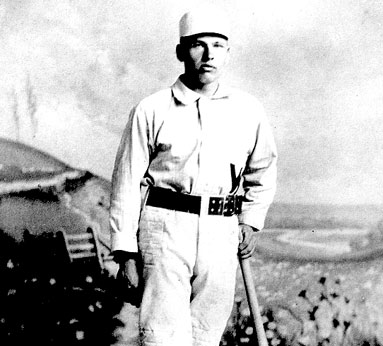
My favorite historical figure from Deaf History is one of the least known – even in his own field. His name is William Ellsworth Hoy. He was often called “Dummy” Hoy. He is the first Deaf Person to have a successful career in Major League Baseball. Hoy play from 1886 to 1902. According to many sources (online, encyclopedias, the tour guides at the Legends of the Game Museum, Arlington, TX), Hoy changed the game of baseball because of his style of play and his passion for the game.
Hoy’s biggest contribution is this: the hand signals used by umpires for balls, strikes, safe, and out are all because of him. In short – all fans of baseball are better able to enjoy the game because of him.
There is a website dedicated to his story at https://www.dummyhoy.com. A great story. A wonderful piece of the history of the Deaf Culture.
People Who Advance Themselves… Dummy Hoy
by Susan (VA) | March 8, 2013
Wow. It is honestly amazing the things that people can do to pull themselves out of their predicament. I think that there are very few people in this world that can dare say that they can’t do anything about their situation because as these historical figures have proven, there is always something you can do. Whether it is fighting racism or sexism or just plain prejudice, I admire the strength of those who forge their own path instead of giving up.
When it comes to picking my favorite person I’ll have to pick Will Dummy Hoy. I play sports and I could not imagine how difficult it would possibly be to play one without the use of your ears. Especially in baseball, a sport that is so centered around communication. Dummy Hoy managed to not only become one of the best at his sport but devise a way to communicate with his teammates that was widely accepted by the players. I think his advancement is amazing and that he truly had a gift, not just for baseball. :)
William “Dummy” Hoy
by Sharon Westerholm (Seguin, TX USA) | March 8, 2013
Baseball is one of the few sports played at the professional level where the game itself hasn’t changed much over the years. Dummy Hoy’s contribution to the game is still seen today in how umpires, players and fans keep count of strikes and balls. He played the game well, but he also showed how Deaf people adapt to make it in the hearing world. Because of Hoy’s love for the game, he found a way to play the game. It still amazes me that he is not in the baseball Hall of Fame.
I Met William Dummy Hoy
by Peggy (Ohio)
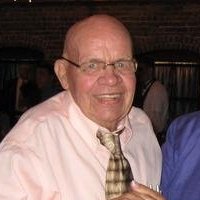
William Dummy Hoy. My parents are deaf and when I was little I met him at a Ohio School for the Deaf. Now that I teach ASL and I teach a unit on famous deaf people I can tell my students that I met him. Plus was at the DPN rally with my parents. Amazing how our history catches up with up when we get older. My hearing students love learning ASL and I love teaching it!
William “Dummy” Hoy
by Allison Liu (Colorado) | May 16, 2015
I first heard of William “Dummy” Hoy on a show called Switched at Birth. Daphne, one of the deaf characters, during the first all ASL show ever aired on television, was talking to her friends about “drawing inspiration from all the deaf people who had paved the road before them.” She and her group of deaf friends were plotting a protest to save their school, Carlton School for the Deaf, and she mentioned probably the most accomplished deaf baseball player in history, and how he created the use of hand signals in baseball. I was fascinated.
It’s amazing to me how much of a difference a single person can make. They can literally change history, and that’s what William Hoy did. He changed the form of communication that would be used during baseball in the future.
Although, William “Dummy” Hoy would have gone down in the books even if he had not been deaf, because he was an amazing player. He hit the first grand-slam in the American League and finished his career after playing a record number of games (1,792) in the Major Leagues! When I learned of Hoy, to me he was not only a great baseball player, but a source of inspiration and a symbol of chasing after my goals.
William “Dummy” Hoy: Deaf Wonder
by Andrew (Florida) | March 8, 2013
It makes me sad when I see or hear about others mistreating the deaf. It shocks me to know that there was a time that they were not accepted.
However, it warms my heart to see a plethora of people making their mark for deaf people; some of them even for the blind as well. But out of all of these I managed to pick one favorite–William “Dummy” Hoy.
What first attracted me to him was the fact that he was a sports player. I’ve always had a thing for sports, especially baseball. I just think that it is amazing how someone could affect the sports system so much. I think that it is great to see people break barriers. He was basically a deaf Jackie Robinson. Just like Jackie Robinson, he paved the way for others of his kind and changed the way that the sport was played forever.
All people are different, and accepting them is something that we all need to do. I’m glad to see that over the years, we have learned this. Integration of all people is a worldwide goal I would be happy to see, and it’s always good to see different people step up to the plate to make it happen.
Dummy is no Dummy
by Patricia Robles (Imperial, CA, USA) | May 22, 2015
My favorite person from Deaf History is William “Dummy” Hoy.
William “Dummy” Hoy lived from 1862 to 1961 (almost 100 years!). He was born hearing, but became deaf at age 3 due to meningitis. He was a great athlete and played baseball, making it all the way to the Major Leagues! During his 15 years in the Major Leagues, he broke so many baseball records. He has the longest Major League Baseball career of any Deaf person. Additionally, he is the 2nd longest-living MLB player in history.
I grew up in a sports family, meaning my dad played baseball while I was a baby and child, and my brother played baseball while I was a child and teenager. All of my children have at one point played baseball, softball, basketball, and mostly soccer. During the years that my son played baseball, I would sometimes volunteer as official scorekeeper. This meant I had to play very close attention to every single part of the game. It always fascinated me how the catchers would communicate to the pitchers with signs, since they cannot communicate verbally during play.
Little did I know that a Deaf Major League Baseball player, yes, Dummy Hoy, had a huge impact on that enormous part of baseball! He is also credited for the umpire signs used in baseball, such as “out” and “safe.” These signs are used worldwide in the major leagues, in college/school baseball, in little leagues, in softball, etc. This is an important piece of history that I did not know and when I learned about Dummy, it made me happy to know that a Deaf MLB player did all this. Just look at the impact he made in the world of sports!
References:
deafpeople.com/history/history_info/ellsworth.html
en.wikipedia.org/wiki/Dummy_Hoy
I Don’t Think He Was A Dummy!
by Aslin Mize (Springtown Tx USA) | May 8, 2015
My favorite person that I read about was William “Dummy” Hoy. I have read about Helen Keller and on the history of Sign Language but, never about him and I found him very interesting. I think because just to think that all those signs that we use in baseball or most of them are from a deaf person! I just found interesting as well as him hitting the first grand-slam home run for the American League. Like you said, it’s crazy to think that they had such a huge impact on baseball and no one really knows about him. I didn’t I think that’s why I was so inspired by his story and many others.
I Choose William Hoy
by Patricia (Salt Lake City, Utah) | March 8, 2013
William Hoy was a very bright man. After completing his high school education, he set up a shoe repair shop and played baseball on the weekends. He was so talented and played so intelligently that he progressed to playing professionally, even in Major League Baseball. He established a number of records, including bases stolen and outs at home base. Reportedly he was a quick runner.
Hoy played professional baseball from about 1888 to 1902. This article says he was responsible for the signs used in baseball, but Wikipedia states it probably was some other people.
After Hoy’s baseball career, he and his wife (also deaf) operated a dairy farm. He certainly was not afraid to try new things! Some of his children grew up to be community leaders, including a judge and a state representative.
Athletics and Deafness
by Amanda C. (Modesto, California) | March 8, 2013
I’d have to say that my favorite person that I have been introduced to has to be William Hoy, the baseball player.
I myself do not know any deaf people or have much interaction with many people in my community that are deaf. However I do work for a company that provides behavioral support and tutoring for children with autism. Some children with autism can have very limited to no speech at all. And in these cases typically we will introduce and teach a PECS (picture exchange communication system), but at times we do use some sign with clients who have family members that are familiar with sign, or high functioning non-verbal children that may be working in a language handicapped class (our school district’s label) where several other children and teachers sign.
Originally before becoming involved in the field of autism, I was a gymnastics instructor for all levels of gymnastics. The majority of the children I coached where “typical”. However over the years of coaching I had the pleasure of coaching several children with various muscular problems, verbal disorders, ASD disorders, and mild deafness. All of this led me to my line of work today.
So I guess the reason I chose William Hoy is because I always have a soft spot in my heart for those who do not let obstacles stand in their way to prevent them form achieving their goals in sports. I personally believe that sports activities are a great way to learn about yourself and develop a sense of self worth and good self esteem. It’s great social interaction for people at any verbal or non-verbal level.
William Hoy
by Emma Hill (Seaside, Oregon) | March 8, 2013
It was so neat to read about William Hoy. I hadn’t known about him until reading this account of deaf history, which is really well written by the way. It was short, but so full of pertinent information. I think you’re absolutely right, it is amazing that he’s not better known. I guess I always wondered about the signs made in the game of baseball, and now I understand. I think it’s people like this that really have made history for the deaf community. It’s the different roles and activities in life that have been represented by someone in the community that make it more and more aware to all the equality of man, hearing or deaf. Hoy is one of those people. I’m sure he had an interesting, long and difficult road to get where he got. (I’m excited to read more of his history.)
I was also very happy to know more about all of these people that played a part in the forming of sign language. I can’t imagine how excited the deaf community must have been to finally come together in a place of their peers to further their education and finally be able to prove their intelligence to the people around them. It’s so disgusting to think of the oppression deaf generations much earlier in time had endured.


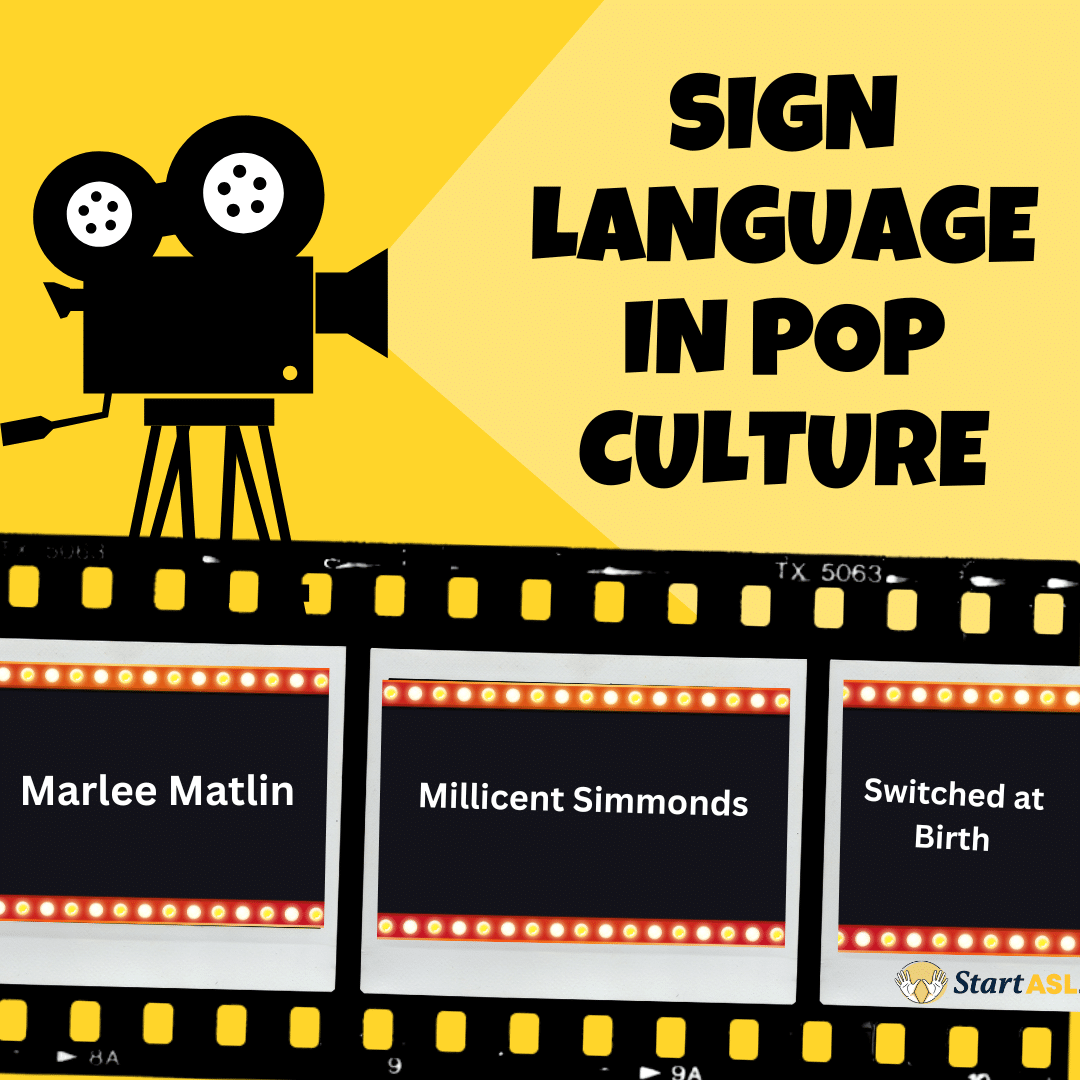

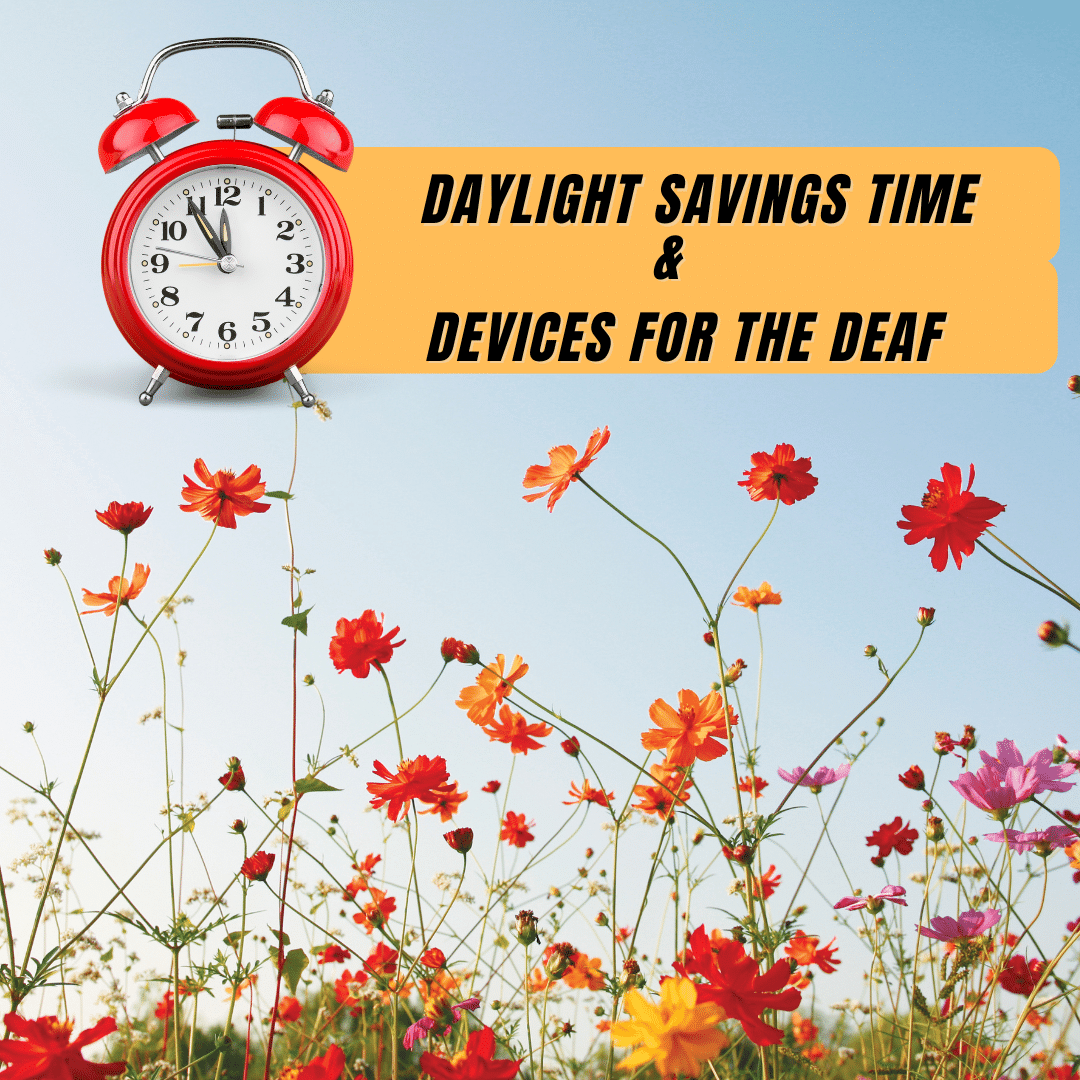
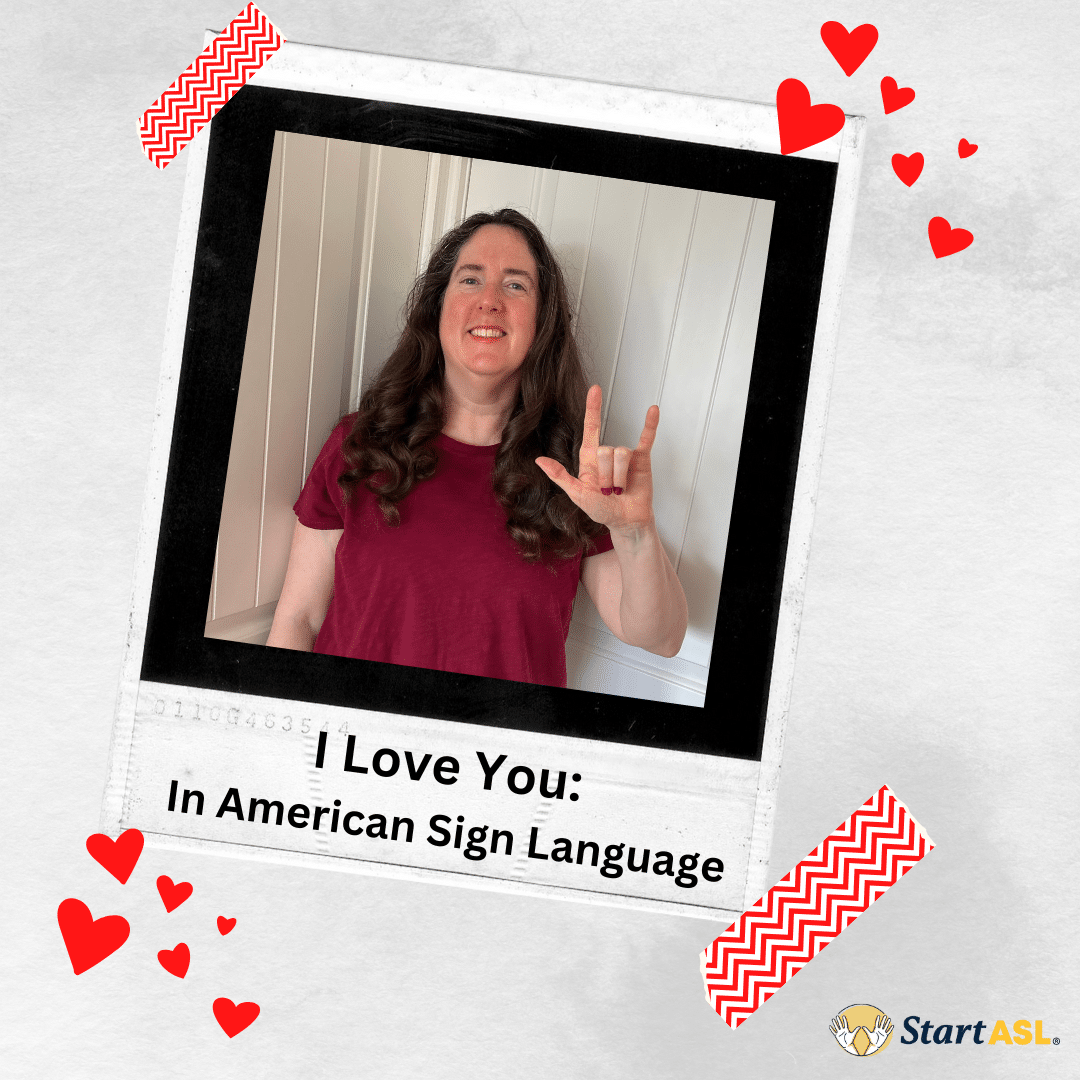





11 Responses
u hhhhhhhhhhhhhhhhhhhhhhhhhhhhhhhhhhh
Did Hoy ever become a part of the very sport he changed – was he finally added to baseballs hall of fame? He really should be given more credit, – he is without a doubt an inspiration and so much more. It would be unfair to not give Hoy the respect and honor he deserves.
I love to get your baseball I never knew who came up with the sign language hand language all that stuff and but I caught part of this movie about dummy hoy about a month ago and I want to see it all I thought it was a real good movie and I thought it was awesome what he done goes to show just cause you got some kind of handicap that don’t mean you can’t do something that don’t mean you can’t be somebody
cool
There is NO S in Houcktown ! I know because I was born and raised there.
Guessing That’s Not Whatever It Just Happened Before Finished His Graduation At Ohio School For The Deaf, probably the old saying goes as misquoted that many times wherever I wasn’t particularly interested in nominating some formerly classmates during 1970’s Big Red Machine aka Pete Rose, Johnny Bench, Joe Morgan, etc.
I wasn’t ever playing for Ohio Deaf baseball game, insisted that I was playing Little League Baseball team that had the second All Star Title Shots, local district school
As the same things I heard some deaf people complained that William Dummy Hoy never inducted Hall Of Fame In Cooperstown, NY that’s not how they just wanted to see that for themselves anymore.
Certainly, we hope that it’d just wait after that time capsule, too bad … Why wouldn’t they let me play Ohio Deaf uniform to bat a home plate eventually on playing field practice a few times, because they as unskilled teammates, played for Ohio Deaf baseball games, too. However, William Hoy would’ve loved to watch me playing Ohio Deaf uniform, he didn’t think about the Cincinnati Reds at all. That truly saddened many Ohio Deaf graduates who disliked my skilled ball game, rather think for themselves to be angry about losing many ball games, not while exactly I wanted to play for, then William Hoy won’t be very disappointed about themselves OHIO DEAF!!!
Guessing That’s Not Whatever It Just Happened Before Finished His Graduation At Ohio School For The Deaf, probably the old saying goes as misquoted that many times wherever I wasn’t particularly interested in nominating some formerly classmates during 1970’s Big Red Machine aka Pete Rose, Johnny Bench, Joe Morgan, etc.
I wasn’t ever playing for Ohio Deaf baseball game, insisted that I was playing Little League Baseball team that had the second All Star Title Shots, local district school
As the same things I heard some deaf people complained that William Dummy Hoy never inducted Hall Of Fame In Cooperstown, NY that’s not how they just wanted to see that for themselves anymore.
Certainly, we hope that it’d just wait after that time capsule, too bad … Why wouldn’t they let me play Ohio Deaf uniform to bat a home plate eventually on playing field practice a few times, because they as unskilled teammates, played for Ohio Deaf baseball games, too. However, William Hoy would’ve loved to watch me playing Ohio Deaf uniform, he didn’t think about the Cincinnati Reds at all. That truly saddened many Ohio Deaf graduates who disliked my skilled ball game, rather think for themselves to be angry about losing many ball games, not while exactly I wanted to play for, then William Hoy won’t be very disappointed about themselves OHIO DEAF!!!
Do not feel the need of not calling him Dummy, he embraced it. There is a difference between “d” and “D”, I would suggest that you check your dictionary the difference.
Guessing That’s Not Whatever It Just Happened Before Finished His Graduation At Ohio School For The Deaf, probably the old saying goes as misquoted that many times wherever I wasn’t particularly interested in nominating some formerly classmates during 1970’s Big Red Machine aka Pete Rose, Johnny Bench, Joe Morgan, etc.
I wasn’t ever playing for Ohio Deaf baseball game, insisted that I was playing Little League Baseball team that had the second All Star Title Shots, local district school
As the same things I heard some deaf people complained that William Dummy Hoy never inducted Hall Of Fame In Cooperstown, NY that’s not how they just wanted to see that for themselves anymore.
Certainly, we hope that it’d just wait after that time capsule, too bad … Why wouldn’t they let me play Ohio Deaf uniform to bat a home plate eventually on playing field practice a few times, because they as unskilled teammates, played for Ohio Deaf baseball games, too. However, William Hoy would’ve loved to watch me playing Ohio Deaf uniform, he didn’t think about the Cincinnati Reds at all. That truly saddened many Ohio Deaf graduates who disliked my skilled ball game, rather think for themselves to be angry about losing many ball games, not while exactly I wanted to play for, then William Hoy won’t be very disappointed about themselves OHIO DEAF!!!
Need to learn more about him. My father was born here in the US after his parents came to AMerica. I wonder if his family also come from Ireland. I was excited to learn more when I heard about the book obout on a talk show.
jane cooch